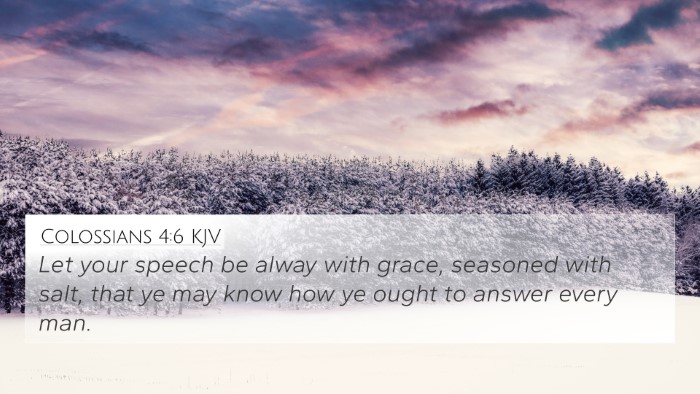Understanding Proverbs 18:4
The verse Proverbs 18:4 states: "The words of a man's mouth are as deep waters, and the wellspring of wisdom as a flowing brook." This verse reflects the profound nature of spoken words and their capacity to convey wisdom. Below is a summary of insights derived from various public domain commentaries, highlighting the key themes and interconnections within the Bible.
Summary of Insights
This verse emphasizes both the depth and value of wise words, illustrating how verbal expressions can contain significant insight. Below are some essential points extracted from commentaries by Matthew Henry, Albert Barnes, and Adam Clarke:
-
Matthew Henry:
Henry relates the depth of a man's words to the profound insights and thoughts that come from a well-informed and thoughtful person. He emphasizes the importance of discernment in understanding the wisdom expressed through words.
-
Albert Barnes:
Barnes elaborates on the metaphor of 'deep waters', suggesting that just as one cannot see the bottom of deep waters, the true meaning of words may not be apparent at first glance. He encourages readers to seek the deeper truths behind spoken words.
-
Adam Clarke:
Clarke focuses on the imagery of 'a flowing brook,' which suggests that true wisdom is not stagnant but continuously flowing and accessible to those who seek it. He posits that wisdom derived from God flows freely and abundantly to those who are receptive.
Bible Verse Cross-References
To understand the inter-Biblical dialogue surrounding Proverbs 18:4, we can examine several verses that relate to its themes of wisdom, the power of words, and their implications:
- Proverbs 1:6 - "To understand a proverb and an enigma, the words of the wise and their riddles."
- Proverbs 10:11 - "The mouth of the righteous is a well of life, but violence covers the mouth of the wicked."
- Proverbs 12:18 - "There is one who speaks like the piercings of a sword, but the tongue of the wise promotes health."
- Proverbs 13:14 - "The law of the wise is a fountain of life, to turn one away from the snares of death."
- Proverbs 15:4 - "A wholesome tongue is a tree of life, but perverseness in it breaks the spirit."
- James 3:10 - "Out of the same mouth proceed blessing and cursing. My brethren, these things ought not to be so."
- Matthew 12:34 - "For out of the abundance of the heart the mouth speaks."
Connections Between Bible Verses
The thematic connections established through cross-referencing these scriptures elucidate the relationship between wisdom and the spoken word. Here are some insights into how these connections work:
- Wisdom and Speech: The verses collectively underscore how wise speaking is rooted in inner wisdom, highlighting that true wisdom influences our communication.
- The Power of Words: The collective insights portray the power of words to either foster life or cause harm, which resonates with both the Old and New Testament teachings.
- Continuous Flow of Wisdom: The imagery of water signifies that wisdom is not static, suggesting a continual pursuit of understanding and the importance of context in interpretation.
Thematic Bible Verse Connections
Connecting Proverbs 18:4 with other verses sheds light on the overarching biblical theme of communication and wisdom:
- Links between the teaching of Proverbs and the Epistles demonstrate a consistent biblical narrative on the importance of praiseworthy speech.
- Comparative studies of wisdom literature reveal that understanding the deep waters of speech is integral to living a wise life.
- Thematic connections with the Gospels illustrate how Jesus and the Apostles embodied the wisdom spoken of in Proverbs, emphasizing the life-giving aspects of their words.
Tools for Bible Cross-Referencing
Utilizing tools for cross-referencing can enhance understanding of connections in scripture:
- Bible Concordance: A key resource for identifying specific terms and their occurrences throughout the Bible.
- Bible Cross-Reference Guide: This can help trace thematic links and scriptural parallels effectively.
- Cross-Reference Bible Study: Engaging in this method promotes a more profound comprehension of biblical ideas and their interrelations.
How to Use Bible Cross-References
Understanding how to find and utilize cross-references can be particularly valuable for sermon preparation, personal study, and thematic exploration:
- Identifying Connections: Look for keywords or themes in your primary verse and seek additional verses that share similar concepts.
- Contextual Study: When researching cross-references, consider the full context of each passage to understand its implications better.
- Comparative Analysis: Analyze how different passages reinforce or complement each other, offering a more multidimensional understanding of biblical truths.
Conclusion
Proverbs 18:4 serves as a crucial reminder of the importance of carefully chosen words and the wisdom they may contain. By utilizing the insights provided through public domain commentaries and connecting to related scriptures, readers can grasp the deeper meaning of this verse and its application in life. Engaging with tools for cross-referencing and thematic exploration enriches the journey of understanding the Bible, revealing the profound theological tapestry that binds the scriptures together.












